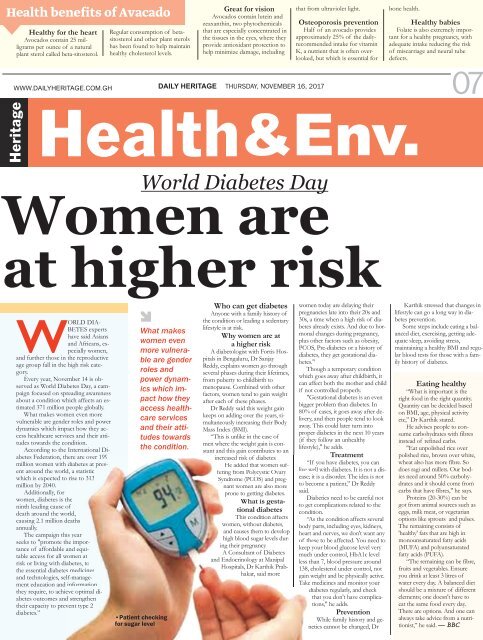Daily Heritage November 16
Create successful ePaper yourself
Turn your PDF publications into a flip-book with our unique Google optimized e-Paper software.
Nov <strong>16</strong>/17 NEW.qxp_Layout 1 11/15/17 9:07 PM Page 6<br />
Health benefits of Avacado<br />
Healthy for the heart<br />
Avocados contain 25 milligrams<br />
per ounce of a natural<br />
plant sterol called beta-sitosterol.<br />
Regular consumption of betasitosterol<br />
and other plant sterols<br />
has been found to help maintain<br />
healthy cholesterol levels.<br />
Great for vision<br />
Avocados contain lutein and<br />
zeaxanthin, two phytochemicals<br />
that are especially concentrated in<br />
the tissues in the eyes, where they<br />
provide antioxidant protection to<br />
help minimize damage, including<br />
that from ultraviolet light.<br />
Osteoporosis prevention<br />
Half of an avocado provides<br />
approximately 25% of the dailyrecommended<br />
intake for vitamin<br />
K, a nutrient that is often overlooked,<br />
but which is essential for<br />
bone health.<br />
Healthy babies<br />
Folate is also extremely important<br />
for a healthy pregnancy, with<br />
adequate intake reducing the risk<br />
of miscarriage and neural tube<br />
defects.<br />
WWW.DAILYHERITAGE.COM.GH<br />
DAILY HERITAGE THURSDAY, NOVEMBER <strong>16</strong>, 2017<br />
&Env.<br />
World Diabetes Day<br />
Women are<br />
at higher risk<br />
WORLD DIA-<br />
BETES experts<br />
have said Asians<br />
and Africans, especially<br />
women,<br />
and further those in the reproductive<br />
age group fall in the high risk category.<br />
Every year, <strong>November</strong> 14 is observed<br />
as World Diabetes Day, a campaign<br />
focused on spreading awareness<br />
about a condition which affects an estimated<br />
371 million people globally.<br />
What makes women even more<br />
vulnerable are gender roles and power<br />
dynamics which impact how they access<br />
healthcare services and their attitudes<br />
towards the condition.<br />
According to the International Diabetes<br />
Federation, there are over 199<br />
million women with diabetes at present<br />
around the world, a statistic<br />
which is expected to rise to 313<br />
million by 2040.<br />
Additionally, for<br />
women, diabetes is the<br />
ninth leading cause of<br />
death around the world,<br />
causing 2.1 million deaths<br />
annually.<br />
The campaign this year<br />
seeks to "promote the importance<br />
of affordable and equitable<br />
access for all women at<br />
risk or living with diabetes, to<br />
the essential diabetes medicines<br />
and technologies, self-management<br />
education and information<br />
they require, to achieve optimal diabetes<br />
outcomes and strengthen<br />
their capacity to prevent type 2<br />
diabetes.”<br />
What makes<br />
women even<br />
more vulnerable<br />
are gender<br />
roles and<br />
power dynamics<br />
which impact<br />
how they<br />
access healthcare<br />
services<br />
and their attitudes<br />
towards<br />
the condition.<br />
•Patient checking<br />
for sugar level<br />
Who can get diabetes<br />
Anyone with a family history of<br />
the condition or leading a sedentary<br />
lifestyle is at risk.<br />
Why women are at<br />
a higher risk<br />
A diabetologist with Fortis Hospitals<br />
in Bengaluru, Dr Sanjay<br />
Reddy, explains women go through<br />
several phases during their lifetimes,<br />
from puberty to childbirth to<br />
menopause. Combined with other<br />
factors, women tend to gain weight<br />
after each of these phases.<br />
Dr Reddy said this weight gain<br />
keeps on adding over the years, simultaneously<br />
increasing their Body<br />
Mass Index (BMI).<br />
“This is unlike in the case of<br />
men where the weight gain is constant<br />
and this gain contributes to an<br />
increased risk of diabetes.<br />
He added that women suffering<br />
from Polycystic Ovary<br />
Syndrome (PCOS) and pregnant<br />
women are also more<br />
prone to getting diabetes.<br />
What is gestational<br />
diabetes<br />
This condition affects<br />
women, without diabetes,<br />
and causes them to develop<br />
high blood sugar levels during<br />
their pregnancy.<br />
A Consultant of Diabetes<br />
and Endocrinology at Manipal<br />
Hospitals, Dr Karthik Prabhakar,<br />
said more<br />
women today are delaying their<br />
pregnancies late into their 20s and<br />
30s, a time when a high risk of diabetes<br />
already exists. And due to hormonal<br />
changes during pregnancy,<br />
plus other factors such as obesity,<br />
PCOS, Pre-diabetes or a history of<br />
diabetes, they get gestational diabetes."<br />
Though a temporary condition<br />
which goes away after childbirth, it<br />
can affect both the mother and child<br />
if not controlled properly.<br />
"Gestational diabetes is an even<br />
bigger problem than diabetes. In<br />
80% of cases, it goes away after delivery,<br />
and then people tend to look<br />
away. This could later turn into<br />
proper diabetes in the next 10 years<br />
(if they follow an unhealthy<br />
lifestyle)," he adds.<br />
Treatment<br />
“If you have diabetes, you can<br />
live well with diabetes. It is not a disease;<br />
it is a disorder. The idea is not<br />
to become a patient,” Dr Reddy<br />
said.<br />
Diabetics need to be careful not<br />
to get complications related to the<br />
condition.<br />
“As the condition affects several<br />
body parts, including eyes, kidneys,<br />
heart and nerves, we don't want any<br />
of these to be affected. You need to<br />
keep your blood glucose level very<br />
much under control, HbA1c level<br />
less than 7, blood pressure around<br />
138, cholesterol under control, not<br />
gain weight and be physically active.<br />
Take medicines and monitor your<br />
diabetes regularly, and check<br />
that you don't have complications,"<br />
he adds.<br />
Prevention<br />
While family history and genetics<br />
cannot be changed, Dr<br />
Karthik stressed that changes in<br />
lifestyle can go a long way in diabetes<br />
prevention.<br />
Some steps include eating a balanced<br />
diet, exercising, getting adequate<br />
sleep, avoiding stress,<br />
maintaining a healthy BMI and regular<br />
blood tests for those with a family<br />
history of diabetes.<br />
Eating healthy<br />
“What is important is the<br />
right food in the right quantity.<br />
Quantity can be decided based<br />
on BMI, age, physical activity<br />
etc,” Dr Karthik stated.<br />
He advises people to consume<br />
carbohydrates with fibres<br />
instead of refined carbs.<br />
"Eat unpolished rice over<br />
polished rice, brown over white,<br />
wheat also has more fibre. So<br />
does ragi and millets. Our bodies<br />
need around 50% carbohydrates<br />
and it should come from<br />
carbs that have fibres," he says.<br />
Proteins (20-30%) can be<br />
got from animal sources such as<br />
eggs, milk meat, or vegetarian<br />
options like sprouts and pulses.<br />
The remaining consists of<br />
'healthy' fats that are high in<br />
monounsaturated fatty acids<br />
(MUFA) and polyunsaturated<br />
fatty acids (PUFA).<br />
“The remaining can be fibre,<br />
fruits and vegetables. Ensure<br />
you drink at least 3 litres of<br />
water every day. A balanced diet<br />
should be a mixture of different<br />
elements; one doesn't have to<br />
eat the same food every day.<br />
There are options. And one can<br />
always take advice from a nutritionist,”<br />
he said. — BBC


















